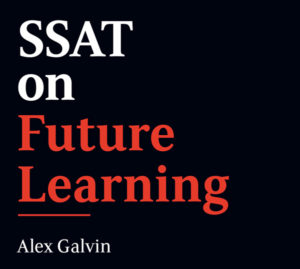 Alex Galvin, Senior Education Lead, SSAT writes a preview to the exclusive member publication SSAT on Future Learning.
Alex Galvin, Senior Education Lead, SSAT writes a preview to the exclusive member publication SSAT on Future Learning.
None of us know the future – we live in turbulent and unpredictable times. But we do have a pretty good idea about how certain aspects of society are likely to develop. Some trends (for example increasing numbers of people working remotely rather than going to work) are already in evidence and we have every reason to expect that they will continue. Broader socio-economic and geographical shifts can also inform our thinking about how future generations may live and work.
This kind of thinking provokes interesting debate about how we prepare our young people for the world beyond school. What is more important – knowledge or skills? Should decisions about curriculum content be focused on preparing students for an imaginary workplace of the future, or opening imaginations through the ‘best which has been thought and said?’ What is more important – what they need to know or what they should know?
When it comes to the classroom, how can we support independence of thought, create lifelong learners and champion creativity while also meeting the requirements of exam specifications? What role should or could technology play?
Earlier this year, SSAT worked with a group of school leaders and Dr William Rankin, director of Unfold Learning and until recently the worldwide director of learning for Apple. We spent a day considering some of these questions and continued the conversations afterwards with Dr Rankin. The key ideas from this work have been captured in SSAT’s new publication, Future Learning.
In our world of ‘fake news’, it has surely never been more important for our young people to be able to apply accurate knowledge to what they hear and read. They need to be able to question the information presented to them, to make sound factual, moral and ethical judgements and to challenge inequalities. We want students to be able to critically evaluate information – to be able to use their knowledge to check the logic of what they are hearing and to think deeply about the information to which they have access.
SSAT talks about this in terms of nurturing ‘effective learner behaviours’ – supporting the development of the multi-faceted personal and social skills that enable someone to become an effective learner. Young people need to become increasingly autonomous, not only learning how to use different strategies but also monitoring and reviewing their learning to determine which strategies have been most effective. Through direct involvement in metacognitive processes, they become increasingly confident in structuring their own learning, establishing behaviours that will support them far beyond school.
In considering this, we believe it is useful to distinguish between what effective learners are, and what they can do.
SSAT believes effective learners are:
- responsible
- critical thinkers and problem solvers
- engaged in the learning process
- resilient and persistent (showing grit), yet flexible/adaptable
- creative and creating
- curious and questioning
- knowledgeable and confident
- good communicators and team players
- digitally literate
- aspirational.
Effective learners can:
- seek relevance and make links to beliefs and experiences
- anticipate, reflect, analyse, justify and plan ahead
- develop a toolkit of strategies to learn
- have the attributes to be work and world ready (content and learning process)
- inquire and innovate
- achieve
- challenge the accepted wisdom
- collaborate with others
- motivate themselves and others to achieve.
Fostering effective learning behaviours
These effective learning behaviours need to be carefully fostered within the classroom. This requires a focus at whole-school level on the development and modelling of effective teacher behaviours as well as students’ learning behaviours. Over time, students and teachers then become more self-aware and able to articulate these processes; and of course, teachers must model effective learning behaviours before they can expect to see them in their students.
So, rather than talking about independent learning, it may be more helpful to think about developing independent learners – independent thinkers, people who can make informed choices and will continue to be effective learners once the support structures of school are removed. We want learners who leave school with the ability to think flexibly and creatively, but also with a sound knowledge base that enables them to make reasoned judgements. The best way to develop independent learners is not always through learning independently; well-structured learning opportunities build confidence and self-awareness.
Future Learning ends with 12 key recommendations. None of them require a radical reimagining of day-to-day behaviours. Instead, they suggest small adjustments in thinking or practice that can help us to find a balance between the competing pressures and priorities of today.
Download the full PDF version of SSAT on Future Learning from The Exchange now.
